
By: Thembie Kamabadya
Presenter talking to sources during the radio program
Statistics show that a majority of Malawi’s population (about 96%) highly depends on biomass either in form of firewood or charcoal for cooking, heating and other day to day needs. This, therefore puts extreme pressure on Malawi’s natural resources especially trees.
In order to help conserve the environment and deal with climate change which is the major effect of deforestation, many people including Non-Governmental Organizations (NGO’s) and other stakeholders have taken it upon themselves to come up with ways on how they can deal with the problem.
One of the NGO’s on the forefront in dealing with this problem of deforestation and climate change is the Renew ‘’N’’ Able Malawi (RENAMA).
On 13 March 2020, RENAMA introduced a radio program “Umoyo ndi Chilengedwe” which talks about deforestation. The program was recorded in Neno, Traditional Authority (T/A) Symon and members of Muwale and Umodzi clubs were the ones that were featured in the program. Neno district is one of the districts in Malawi that is highly affected by this problem.
Officials from the Ministry of Agriculture and from the Department of Forestry were also a part of it. Among other things that were discussed in the program include: the causes, effects of climate change and what the community is doing to fix the problem at hand.
Speaking on the matter, Maria Binosi of Muwale club said that the main reason for deforestation in the area is the lack of jobs as there are no companies or factories in which the people can go and work in.
“Our only source of income here is charcoal burning. Had it been that we had other means of finding money to provide for our day to day needs, then we would not have finished the trees here. We do all this only because we are desperate,” she explained.
People in the district most of the times do not harvest enough food to feed themselves and their families due to little or no rains. This is so because of lack of trees which encourage rainfall as many trees in the Kirk Range have been cut down.
Anne Joni of Umodzi club added that deforestation has not only affected agriculture but also education as girl children are sent out to go look for firewood in faraway places and in so doing, they perform badly as they miss classes. She said she recalls back in those days when trees were plenty and the forests were thick and they did not have to go long distances to fetch firewood, which is not the case right now.
When asked what they are doing in order to deal with this problem, Rita Bestala said that the community is now focused on tree planting so as to replace those trees that have been cut down and that they are only doing so in hope of getting good rains.
In an Interview with Happy Moyo, an agricultural extension worker for Neno district, he said that there have been a number of ways they have been put in place for the people to harvest more. Apart from the tree planting exercise, they are encouraging shifting cultivation for the soil to regain its fertility and the addition of farmyard manure to their farms.
‘’As the Department of Forestry, we are also playing our role in dealing with those that cut down trees carelessly in our forests. Anyone found cutting down trees in the Kirk Range or any other forests here is given a stiff punishment and is charged some amount of money. That money is used to buy tree seedlings to be replaced in those places that have been left bare,” Madalitso Gazamiyala, Neno district forestry extension worker explained.
